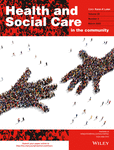The social-psychiatric service and its role in compulsory hospitalization
Funding information
This study was supported by the Ministry for Labor, Health and Social Affairs of North Rhine Westphalia (grant number 24.04).
Abstract
Coercive measures are a sensitive, much-discussed ethical and legal issue in the psychiatric context. Hence, the identification of their predictors and ways of prevention are of utmost importance. The present study aimed to determine the impact of the social-psychiatric services (SPS) in North Rhine Westphalia (NRW) on involuntary admissions according to the German Mental Health Act and to identify predictors for the reduction of these involuntary admissions. A dataset including details from 31 districts and 23 towns in NRW over a time period of 10 years (2005–2014) was analysed regarding the number of involuntary admissions, gender and age of admitted patients, and person/institution initiating the compulsory act. All 56 SPS in NRW were contacted for information on the number of clients/contacts, home visits, areas of responsibility and their involvement in involuntary admissions. Thirty SPS participated in the survey. We found a significant increase of involuntary admissions over time with significantly higher proportions of male patients and patients younger than 60 years in every year. Regarding the characteristics of SPS, a negative correlation between the number of clients contacting the SPS on their own initiative and low-income households was observed. Additionally, the number of clients contacting the SPS on their own initiative was significantly higher in districts/towns associated with lower involuntary admission rates. These data suggest that patient-based factors were of great importance in the context of involuntary admissions. Furthermore, the SPS and home treatment should be strengthened and intensified to achieve lower involuntary admission rates.
CONFLICT OF INTEREST
The authors declare that they have no financial disclosures/conflicts of interests.




